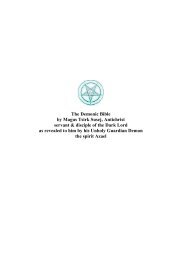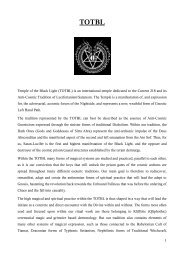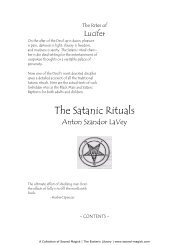Satanism Today - An Encyclopedia of Religion, Folklore and Popular ...
Satanism Today - An Encyclopedia of Religion, Folklore and Popular ...
Satanism Today - An Encyclopedia of Religion, Folklore and Popular ...
Create successful ePaper yourself
Turn your PDF publications into a flip-book with our unique Google optimized e-Paper software.
Judaism <strong>and</strong> Hebrew Scriptures 137<br />
attorney, assigned the task <strong>of</strong> bringing out the<br />
worst side <strong>of</strong> human beings:<br />
<strong>An</strong>d the Lord said to Satan, “Have you<br />
considered my servant Job, that there is none<br />
like him on the earth, a blameless <strong>and</strong> upright<br />
man, who fears God <strong>and</strong> turns away from<br />
evil” Then Satan answered the Lord, “Does<br />
Job fear God for nought Hast thou not put a<br />
hedge about him <strong>and</strong> his house <strong>and</strong> all that he<br />
has, on every side Thou hast blessed the work<br />
<strong>of</strong> his h<strong>and</strong>s, <strong>and</strong> his possessions have<br />
increased in the l<strong>and</strong>. But put forth thy h<strong>and</strong><br />
now, <strong>and</strong> touch all that he has, <strong>and</strong> he will<br />
curse thee to they face.” <strong>An</strong>d the Lord said to<br />
Satan, “Behold, all that he has is in your<br />
power, only upon himself do not put forth<br />
your h<strong>and</strong>” (Job 1:8–12).<br />
Satan then goes forth—with God’s blessing—<br />
to ruin Job. From the viewpoint <strong>of</strong> later, especially<br />
Christian, theology this story can only seem like a<br />
crude, cruel wager, unworthy <strong>of</strong> a just <strong>and</strong><br />
almighty God. If, however, instead <strong>of</strong> being the<br />
Prince <strong>of</strong> Darkness, Satan is simply a loyal member<br />
<strong>of</strong> God’s heavenly host, then the story comes into<br />
focus. Like the angel <strong>of</strong> death, Satan is just an angel<br />
with an unpleasant job description. The notion<br />
that the term Satan might refer to someone with<br />
the role <strong>of</strong> prosecutor is supported by Psalms<br />
109:6, where the author asks, with respect to<br />
someone who is vilifying him, that God appoint an<br />
“accuser” (i.e., a satan) to “bring him to trial.”<br />
Essentially the same underst<strong>and</strong>ing <strong>of</strong> Satan<br />
appears to be embodied in First Chronicles, as the<br />
inspiration for King David’s census, undertaken<br />
for the purpose <strong>of</strong> taxing the people: “Now Satan,<br />
setting himself against Israel, incited David to<br />
count the people” (1 Chronicles 21:1). Although<br />
Satan is thus portrayed as inspiring this action,<br />
David is nevertheless punished for it. The implicit<br />
reasoning here seems to be that although Satan<br />
tempts people to injustice, we have the freedom<br />
to—<strong>and</strong>, therefore, the responsibility for—resisting<br />
or giving in to these suggestions.<br />
If the Satan <strong>of</strong> 1 Chronicles seems to be somewhat<br />
more negative <strong>and</strong> aggressive than the Satan<br />
<strong>of</strong> Job, it is not until the Book <strong>of</strong> Zechariah that<br />
Satan starts to become truly sinister. “Then he<br />
showed me Joshua the high priest st<strong>and</strong>ing<br />
before the angel <strong>of</strong> the Lord, <strong>and</strong> Satan st<strong>and</strong>ing<br />
at his right h<strong>and</strong> to accuse him. <strong>An</strong>d the Lord<br />
said to Satan,‘The Lord rebuke you, O Satan! The<br />
Lord who has chosen Jerusalem rebuke you! Is<br />
not this a br<strong>and</strong> plucked from the fire’” (Zech.<br />
3:1–2) Here Satan is still performing his older<br />
role as accuser, but now God is moved to anger<br />
by Satan’s activity.<br />
Zechariah lived during the time when the<br />
Persians had defeated the Babylonians <strong>and</strong><br />
returned the Jews to Palestine from Babylonia.<br />
Seeking to make them allies, the Persians even gave<br />
the repatriated Jews money to rebuild the Temple.<br />
The Persians were Zoroastrians, whose religious<br />
system was built around the notion <strong>of</strong> an ongoing<br />
conflict between Ahura Mazda, the god <strong>of</strong> light<br />
<strong>and</strong> the upper world, <strong>and</strong> Ahriman, the god <strong>of</strong><br />
darkness <strong>and</strong> the lower world. Partially because <strong>of</strong><br />
their friendly link with the Persians, the Judaism<br />
was influenced by Zoroastrianism. Thus Satan, the<br />
closest thing the Jews had to an evil spirit, was<br />
reconceived as God’s enemy, though he was never<br />
became as powerful as Ahriman.<br />
The tendency to amplify Satan’s role as the<br />
master <strong>of</strong> evil continues in later, noncanonical<br />
books. By the time <strong>of</strong> the emergence <strong>of</strong> the<br />
Qumran community <strong>of</strong> Essenes (a generation<br />
before Jesus), Satan finally becomes the familiar<br />
lord <strong>of</strong> darkness; for example: “The Prince <strong>of</strong><br />
Light thou has appointed to come to our support:<br />
but Satan, the angel Mastema, thou hast created<br />
for the pit; he rules in darkness, <strong>and</strong> his purpose is<br />
to bring about evil <strong>and</strong> sin, (1 QM 19:12). It was<br />
this image <strong>of</strong> Satan, which appears to have been in<br />
general circulation in Palestine during the first<br />
century, that was incorporated into Christianity.<br />
As with Satan, the early Christian notion <strong>of</strong> hell<br />
was drawn from contemporaneous Judaism.<br />
Jewish thinking about the afterlife, in turn, developed<br />
out <strong>of</strong> reflections on the covenant.<br />
The very core <strong>of</strong> Judaism is a covenant relationship—which<br />
is both a contractual agreement<br />
<strong>and</strong> a marriage <strong>of</strong> love—between Yahweh <strong>and</strong> his<br />
chosen people. The ancient Hebrews emphasized<br />
the importance <strong>of</strong> the present life. Like both the<br />
ancient Greeks <strong>and</strong> Mesopotamians, existence
















